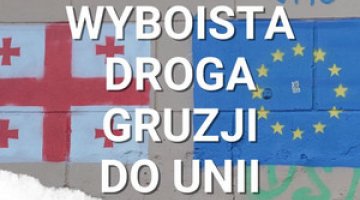Local elections in Georgia: locking down the system
Georgian Dream (GD), the party led by billionaire Bidzina Ivanishvili, which has been in power for 13 years, secured a decisive victory in Georgia’s local elections on 4 October. According to exit polls, the party received 81.7% of the vote nationwide (70% in Tbilisi). The opposition party Strong Georgia – Lelo came second with 6.7%, while third place went to Giorgi Gakharia’s For Georgia (3.7%), a party led by the former GD prime minister who has since joined the opposition. The main opposition forces boycotted the elections, resulting in situations in which only GD candidates ran for mayor in several cities. This was the case in Poti, where the party’s candidate received 100% of the vote. Voter turnout was just under 41%.
The vote was accompanied by turbulent demonstrations, drawing tens of thousands of government opponents to the capital (according to former President Salome Zurabishvili, as many as 100,000, though the actual number was likely at least half that figure). As the crowd gathered on Rustaveli Avenue declared the beginning of a peaceful revolution and the transfer of state power to the people, some protesters attempted to storm the presidential palace, breaching its perimeter fence. They were pushed back by police special forces, who detained, among others, five members of the protest's organising committee. The total number of arrests remains unknown, and further detentions are expected. Dozens were injured in the clashes. The EU High Representative for Foreign Affairs and Security Policy, Kaja Kallas, urged both sides to refrain from violence. She also called on the authorities to uphold the right to freedom of assembly and expression, noting that the elections took place amid months of sustained pressure on civil society and independent media. The ODIHR OSCE observation mission was not present, as Tbilisi issued its invitation too late.
The scale of GD’s victory (any irregularities on election day likely had minimal impact on the outcome) reflects the party’s near-total subordination of the state and its institutions. In the coming weeks, measures aimed at the definitive removal of key opposition forces from public life should be anticipated.
Commentary
- The elections have further strengthened Georgian Dream’s dominance on the political stage. Its successive, increasingly decisive victories stem from two main factors: on the one hand, the party has effectively communicated its message, persuading a significant part of society that it guarantees peace, whereas its opponents would drag Georgia into war; on the other, the country’s stable economic situation has also played a role (GDP growth has been partly driven by the arrival of around 100,000 Russian citizens fleeing mobilisation – a figure now estimated at approximately 70,000). Another significant factor is the steadily consolidating ‘administrative apparatus’ loyal to GD. Virtually all public offices in the country are now held by the party’s appointees, allowing it to be said that Georgian Dream has effectively completed a full takeover of the state.
- The ruling party draws strength from the weakness of a fragmented pro-Western opposition, which lacks both a coherent strategy and the ability to channel public discontent. It has also failed to develop a message that resonates with rural voters and the more conservative segments of society. The wave of protests – ongoing since the parliamentary elections held a year ago – intensified after Prime Minister Irakli Kobakhidze announced, on 28 November 2024, that Georgia would postpone its EU accession process until 2028 (see ‘Georgia is suspending its EU integration process’). These protests have been grassroots-driven, non-partisan, and network-based. So far, they have not produced a clear leader or leadership group, although the opera singer Paata Burchuladze has recently attempted to assume such a role. The main opposition parties likely boycotted the vote to avoid a high-profile defeat, although they publicly justified their decision by refusing to legitimise what they described as a ‘Russian special operation’ – a term used by the pro-Western opposition and the former President to describe the elections.
- Further pressure from the authorities on civil society can be expected, and the prospect of banning certain opposition parties is becoming increasingly real. Georgian Dream has long stated its intention to eliminate its political opponents, particularly the United National Movement (UNM). A parliamentary commission has been set up for this purpose, ostensibly to investigate the UNM’s time in power (2003–2012), although its mandate also covers the subsequent activities of UNM politicians, including its former leader and imprisoned ex-President Mikheil Saakashvili. Any evidence of unlawful actions could serve as a basis for banning the party and potentially others. The likelihood of such a scenario is reinforced by the recent arrest of several UNM politicians, including Levan Khabeishvili, on corruption charges. Several opposition activists are already serving short prison sentences for refusing to appear before the commission. Under current conditions, any improvement in relations between Tbilisi and the West – particularly the EU – is out of the question.





